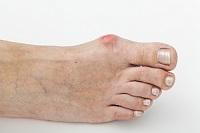Bunions are a common foot problem. Although they tend to become more common as people age, anyone can develop a bunion. The  most common symptom is a bony bump at the base of the big toe, which can become painful and make it difficult to fit into certain shoes and even affect mobility in some cases. You should discuss your symptoms with your podiatrist to avoid potential damage to the joint and other symptoms. Dr. Peter Siroka, a podiatrist in Stamford, CT, offers diagnostic and treatment options for bunions and other foot and ankle problems.
most common symptom is a bony bump at the base of the big toe, which can become painful and make it difficult to fit into certain shoes and even affect mobility in some cases. You should discuss your symptoms with your podiatrist to avoid potential damage to the joint and other symptoms. Dr. Peter Siroka, a podiatrist in Stamford, CT, offers diagnostic and treatment options for bunions and other foot and ankle problems.
Diagnosis and Treatment Options for Bunions in Stamford, CT
Anyone can develop bunions, but there are some factors that can increase the risk and make some people more likely to develop them than others, including:
- Age (they tend to be more common in older adults aged 65 and up)
- Gender (they tend to be more common in women than in men in some cases)
- Family history (if someone in your family has a bunion you may have a higher risk of developing them as well)
- Arthritis or joint damage/injuries
- Wearing high heels or uncomfortable, ill-fitting shoes that are too narrow and crowd the toes
What to Do if You Have a Bunion
Many people continue to function with bunions without difficulty, but they can be painful, uncomfortable, and lead to other problems like corns and calluses from friction between the bunion and your shoes, swelling and inflammation in the joint (bursitis), and pain/inflammation in other parts of the foot.
Treatment Options for Bunions
The best way to protect your feet from bunions is to wear comfortable shoes that fit well and provide adequate support for your foot type and level of activity. The typical treatment options for bunions include:
- Medication
- Splints
- Orthotics
- Surgery
Find a Podiatrist in Stamford, CT
For more information about finding relief and treatment options for your bunion symptoms, contact our office by calling (203) 614-8185 to schedule an appointment with Dr. Siroka today.

